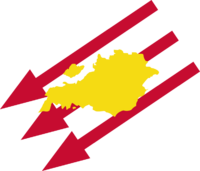Internal State: Difference between revisions
mNo edit summary |
mNo edit summary |
||
| (6 intermediate revisions by the same user not shown) | |||
| Line 1: | Line 1: | ||
[[Category: | [[Category:Arthasthan]] [[Category:History of Arthasthan]] [[Category:Politics of Arthasthan]] {{WIP}} | ||
{{ | [[File:SSWI Satria logo.png|200px|right|thumb|The Symbol of the [[Satrian Section of the Workers' International (Ramprasadist)|Arthani-led Satrian Section of the Workers' International]]]] | ||
| | The '''Internal State''' in [[Arthasthan]] is a term used to refer to the {{wp|deep state}} coalition between the [[Satrian Section of the Workers' International (Ramprasadist)|Arthani-led Satrian Section of the Worker's International]], the [[Arthasthan Armed Forces|military of Arthasthan]], and other pro-Section government officials and civilians. The Satrian Section's role as a "guardian of socialism" in Arthasthan is mandated by the country's socialist constitution which allows the Section-led Internal State to exert significant influence in Arthasthan outside of the normal democratic process. The Internal State is led by key decision-makers in the Satrian Section and the military, although the Satrian Section plays a dominant role. | ||
| | |||
| | The Satrian Section operates independently of the federal government of Arthasthan, while wielding significant influence over it. The Section's constitutional role is to ensure that Arthasthan remains a socialist country and that the country's politics don't stray too far from [[Netaji Thought]], Arthasthan's founding ideology. To achieve this, it follows its own foreign and domestic policies and objectives, even if they contradict or hinder the Arthani government. The most severe example was in 1988 when the Internal State obstructed Arthasthan's attempt to join the [[Bashurat Cooperation Organization]] due to their opposition with closer ties with [[Senria]] and fears over Senrian interference in [[Minkathala]]. The Internal State only relented when Senria agreed to several economic and diplomatic compromises. | ||
| | The central ideology of the Internal State is [[Netaji Thought]] but it is also broadly {{wp|Proletarian internationalism|internationalist}}, {{wp|secularism|secularist}}, {{wp|nationalism|nationalist}}, {{wp|anti-capitalism|anti-capitalist}}, anti-{{wp|Democracy|democratic}}, and anti-{{wp|Liberalism|liberal}}. The diversity of opinion reflects the diversity of the various political factions within the Satrian Section. However the Internal State shares the common principles and values of ensuring Arthasthan remains committed to socialism, treating [[Ajahadya]] as an arch-rival and [[Rongzhuo Strategic Protocol Organisation|ROSPO]] as an existential threat, continuing control over [[Minkathala]], maintaining southern Arthasthan as the heartland of the country, skepticism of closer ties with [[Senria]], and strengthening ties with the member states of the [[Association for International Socialism]]. | ||
| | |||
}} | |||
The | |||
Latest revision as of 05:32, 2 September 2021
This article is incomplete because it is pending further input from participants, or it is a work-in-progress by one author. Please comment on this article's talk page to share your input, comments and questions. Note: To contribute to this article, you may need to seek help from the author(s) of this page. |

The Internal State in Arthasthan is a term used to refer to the deep state coalition between the Arthani-led Satrian Section of the Worker's International, the military of Arthasthan, and other pro-Section government officials and civilians. The Satrian Section's role as a "guardian of socialism" in Arthasthan is mandated by the country's socialist constitution which allows the Section-led Internal State to exert significant influence in Arthasthan outside of the normal democratic process. The Internal State is led by key decision-makers in the Satrian Section and the military, although the Satrian Section plays a dominant role.
The Satrian Section operates independently of the federal government of Arthasthan, while wielding significant influence over it. The Section's constitutional role is to ensure that Arthasthan remains a socialist country and that the country's politics don't stray too far from Netaji Thought, Arthasthan's founding ideology. To achieve this, it follows its own foreign and domestic policies and objectives, even if they contradict or hinder the Arthani government. The most severe example was in 1988 when the Internal State obstructed Arthasthan's attempt to join the Bashurat Cooperation Organization due to their opposition with closer ties with Senria and fears over Senrian interference in Minkathala. The Internal State only relented when Senria agreed to several economic and diplomatic compromises.
The central ideology of the Internal State is Netaji Thought but it is also broadly internationalist, secularist, nationalist, anti-capitalist, anti-democratic, and anti-liberal. The diversity of opinion reflects the diversity of the various political factions within the Satrian Section. However the Internal State shares the common principles and values of ensuring Arthasthan remains committed to socialism, treating Ajahadya as an arch-rival and ROSPO as an existential threat, continuing control over Minkathala, maintaining southern Arthasthan as the heartland of the country, skepticism of closer ties with Senria, and strengthening ties with the member states of the Association for International Socialism.